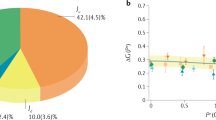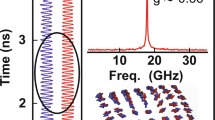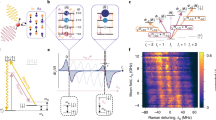Abstract
So far as we know, the idea of a quantised spinning of the electron was put forward for the first time by A. K. Compton (Journ. Frankl. Inst., Aug. 1921, p. 145), who pointed out the possible bearing of this idea on the origin of the natural unit of magnetism. Without being aware of Compton's suggestion, we have directed attention in a recent note (Naturwissenschaften, Nov. 20, 1925) to the possibility of applying the spinning electron to interpret a number of features of the quantum theory of the Zeeman effect, which were brought to light by the work especially of van Lohuizen, Sommerfeld, Landé and Pauli, and also of the analysis of complex spectra in general. In this letter we shall try to show how our hypothesis enables us to overcome certain fundamental difficulties which have hitherto hindered the interpretation of the results arrived at by those authors.
This is a preview of subscription content, access via your institution
Access options
Subscribe to this journal
Receive 51 print issues and online access
$199.00 per year
only $3.90 per issue
Buy this article
- Purchase on Springer Link
- Instant access to full article PDF
Prices may be subject to local taxes which are calculated during checkout
Similar content being viewed by others
Author information
Authors and Affiliations
Rights and permissions
About this article
Cite this article
UHLENBECK, G., GOUDSMIT, S. Spinning Electrons and the Structure of Spectra. Nature 117, 264–265 (1926). https://doi.org/10.1038/117264a0
Issue Date:
DOI: https://doi.org/10.1038/117264a0
This article is cited by
-
Controlling water waves with artificial structures
Nature Reviews Physics (2024)
-
Neo-classical Relativistic Mechanics Theory for Electrons that Exhibits Spin, Zitterbewegung, Dipole Moments, Wavefunctions and Dirac’s Wave Equation
Foundations of Physics (2023)
-
Anomalous Magnetic Moment of Muon
Resonance (2022)
-
Electromagnetic Angular Momentum of an Orbiting Charge
Foundations of Physics (2021)
Comments
By submitting a comment you agree to abide by our Terms and Community Guidelines. If you find something abusive or that does not comply with our terms or guidelines please flag it as inappropriate.



